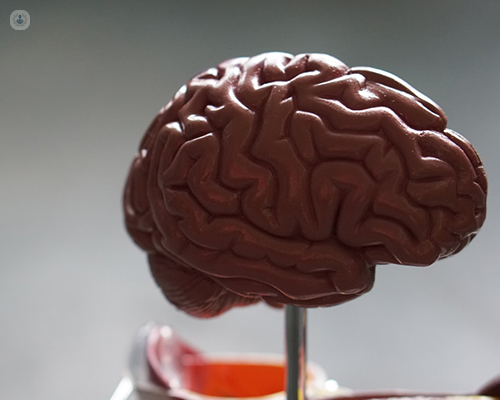Is Parkinson’s disease genetic?
Written by:It is very rare for a health condition to be caused by a change in a single gene and our health is generally the result of a mixture of different genes and other factors such as diet, exercise and exposure to things in the environment around us. Here, one of our top neurologists Dr Dominic Paviour explains whether Parkinson’s disease (PD) is a genetic disorder and how the condition is managed.

Is Parkinson’s disease an inherited disorder?
It used to be stated that a family history of Parkinson’s disease excluded the diagnosis but it is now understood that there are genetic factors that increase the risk of getting PD as well as gene mutations that cause PD. However, it remains very rare for Parkinson’s to run in families and the vast majority of people have what is called ‘idiopathic Parkinson’s’, meaning that there’s no known cause.
People diagnosed with Parkinson's at, say, under the age of 45 are more likely to have a genetic link. Changes have been identified in genes including alpha-synuclein, parkin, PINK1 and DJ-1, which cause symptoms to develop at a young age.
A change in the LRRK2 gene is probably the most common genetic variant linked to Parkinson’s and in the UK, around one in 100 people with Parkinson’s carry it. It’s more common in North African and Jewish populations. People who carry this variant have around a 70% chance of being diagnosed by the age of 80.
As well as single genetic changes that directly cause the condition, there are also gene mutations that increase the risk of getting PD. The most common of these is having a variant in the GBA gene. Carrying one of these genetic risk factors means a person is at increased risk of developing Parkinson’s disease but often only very slightly. It is not routine to test for these genes in individuals with no symptoms but a family history of PD.
Can Parkinson’s disease be treated?
The symptoms of PD can be treated with dopamine replacement.
The most effective drug for symptom control is Levodopa. Other medications include dopamine agonists (Ropinirole, Pramipexole tablets and Rotigotine transdermal patches), selective type B monoamine oxidase inhibitors (Selegiline, Rasagiline) and catechol-O-methyl transferase (COMT) inhibitors (Entacapone and Tolcapone), which can all be combined with Levodopa.
A combination of lower doses of Levodopa with these adjuvant therapies would be typical therapy in the first years of disease management.
In addition to drug treatment, skilled physical therapy and programmed exercise are of great importance.
In patients with “motor fluctuations”, where the effect of tablets wears off before the next dose is due, three effective treatment options are available. These include Apomorphine (a dopamine agonist) via subcutaneous administration, Levo-Dopa/carbidopa that is infused via a tube directly into the gut (Duodopa), and deep brain stimulation (DBS).
Currently, there is no known therapy that slows the progression of the underlying pathological disease process. However, drug trials of repurposed agents such as Exenatide are promising. Exenatide is a Glucagon-like peptide-1 receptor agonist (GLP-1) and is licensed for the treatment of patients with type 2 diabetes.
Studies have confirmed that Exenatide has beneficial effects on nerve cells when tested in the laboratory and in phase two studies in patients with PD, over a period of 48 weeks, the drug was well tolerated. It showed encouraging effects on the movement and non-movement aspects of the disease and the data suggested that Exenatide may have a neuroprotective effect, for example, stopping the nerve cells dying in PD.
Read more: the early signs of Parkinson's disease
Book an appointment today to see Dr Paviour if you are concerned about Parkinson’s disease affecting you or your loved one.


